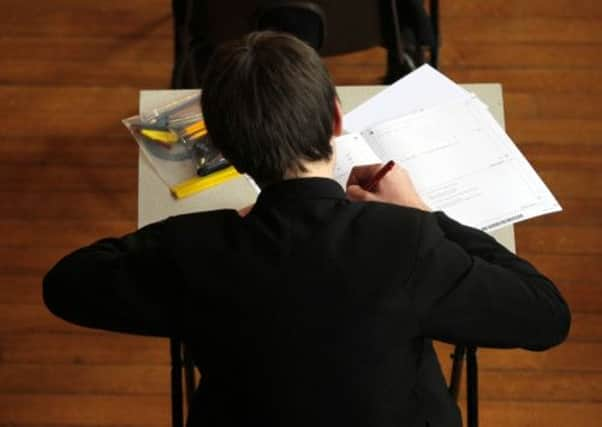Teachers lose faith with GCSEs as doubts grow over marking


It reveals that many teachers believe that marking of GCSE papers is less accurate than it was in the past, while more than a third say that some of their students do not get the right grade – a view shared by parents.
Ofqual chief executive Glenys Stacey admitted that there is “an appetite for change and improvement” to the GCSE system.
Advertisement
Hide AdAdvertisement
Hide AdThe report, based on surveys of around 600 teachers, 200 headteachers and 3,213 members of the public including parents and students, analysed perceptions of A-levels and GCSEs.
The findings show that confidence in GCSEs has dropped significantly, with teachers expressing serious fears about the current system.
It suggests that this has been fuelled, in part, by last summer’s GCSE English grading controversy, which has also damaged the public’s confidence in the exams.
Just over half (56 per cent) of heads and a similar proportion of teachers (55 per cent) said they were confident in the GCSE system – around 30 percentage points lower than the proportion who said they were confident in A-levels.
Advertisement
Hide AdAdvertisement
Hide AdFour in five (80 per cent) of heads and three in five (60 per cent) of teachers said they had much less confidence in the system than they did last year, the report found.
Almost nine in ten (89 per cent) of headteachers and over three quarters (77 per cent) of teachers said they had “considerable” concerns about GCSEs, citing worries about incorrect marking of papers, grade boundary issues, incorrect grading, and lack of information and knowledge about standards.
About a third of heads were confident in the marking of GCSE papers, along with 59 per cent of teachers, while two thirds (64 per cent) of heads and over a third (38 per cent) of teachers said they they thought the accuracy of marking has dropped in the past two years.
The report also reveals that fewer than two-thirds of heads, teachers and parents believe that all, or at least three-quarters of GCSE students, get the right grades.
Advertisement
Hide AdAdvertisement
Hide AdMs Stacey said it was important that the regulator knew of people’s concerns. “We want to see confidence in GCSEs return as they become more robust and assessment is seen to be, and is, fair and accurate,” she said.
“I think there is an appetite for change and improvement. We have an opportunity with the reform of GCSEs and A-levels to develop new – or strengthen existing - high quality qualifications that are stimulating to teach and worthwhile to study.”
The report reveals the impact of last summer’s GCSE English debacle, in which it was claimed that tens of thousands of teenagers received lower results than expected after grade boundaries were moved mid-year.
Four in five headteachers questioned by Ofqual said that their confidence in GCSE exams had been affected “a lot” or “a fair amount” by the controversy, along with two-thirds of teachers.
Advertisement
Hide AdAdvertisement
Hide AdTwo fifths of the public and parents said that their confidence in the system had been affected.
The report comes amid a major overhaul of GCSEs, announced by Education Secretary Michael Gove in March.
Under the plans, GCSE exams will taken at the end of two-year courses, rather than in modules throughout, as well as an increase in extended questions and less internal assessment.
A Department for Education spokesman said: “The Secretary of State warned when he came to office that the GCSE system had serious weaknesses and needed fundamental reform.
“This report shows that these concerns are widespread.
Advertisement
Hide AdAdvertisement
Hide Ad“The changes we are making will restore confidence in GCSEs - scrapping the modular approach, which led to last year’s grading problems, and most coursework.”
But Brian Lightman, general secretary of the Association of School and College Leaders (ASCL) suggested that the constant reforms were contributing to the loss in confidence.
He said: ““We need stability, not constant change which will only undermine confidence further.”